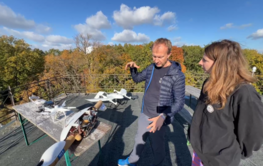The GFZ was the main scientific partner. GFZ researchers Lioba Virchow and Mikhail Tsypin won the poster competition for young scientists, Johannes Hart reached the final.
The Nepalese Foreign Minister Dr Arzu Rana Deuba visited the GFZ. In focus: cooperation on an innovative early warning system for natural disasters such as glacier and landslides.
It provides important information for the construction of Berlin's largest heat storage facility in Adlershof. The aim is to store heat from renewable sources underground in summer for use in winter.
The long-term goal is an early warning system for all natural hazards and all the people on earth. Interview with Abror Gafurov on the occasion of the COP29 in Baku.
At the 22nd Autumn School of the GFZ School Lab, scientists from various research institutions offered training to around 100 teachers on the topic of ‘Urban spaces: hotspots in the Earth system’.
In October 1994, the drilling for the deepest hole in Germany reached its final depth of more than 9 kilometres. A ceremony with an open day was held on site in Windischeschenbach (Bavaria).
Twitch streamer Sofia Kats & Felix Pohl from the UFZ reported live in a new format of science communication - about drones & satellites, mountain formation & earthquakes. Watch the video here.
A review in questions and answers by experts from the Helmholtz Research Field “Earth and Environment”: GFZ, Helmholtz Centre for Environmental Research UFZ and Karlsruhe Institute of Technology KIT
Saturday, 9/14 | 17:30 | Public lecture by GFZ researcher Liane G. Benning at GDNÄ meeting: What algae have to do with the ice melt on Greenland
On 2 September, eleven trainees in scientific/technical and commercial fields and two volunteers started their training with an induction day. A warm welcome!





![[Translate to English:] [Translate to English:] Abror Gafurov von dem Schriftzug "Welcome to Azerbaijan" und den UN und COP Logos](/fileadmin/_processed_/2/5/csm_2024_11_Baku_COP29_Abror_Gafurov_512f85b5e2.jpeg)
![[Translate to English:] Many people are listening to a presentation in the GFZ lecture hall.](/fileadmin/_processed_/c/a/csm_1_Bild1_hell_6be603fa54.jpeg)



![[Translate to English:] Ice landscape with five red tents](/fileadmin/_processed_/8/9/csm_Zeltlager_auf_dem_Eis_Urheberin_Jenine_McCutcheon_ebb7cd0301.jpeg)
